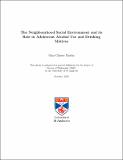Files in this item
The neighbourhood social environment and its role in adolescent alcohol use and drinking motives
Item metadata
| dc.contributor.advisor | Currie, Candace | |
| dc.contributor.advisor | Inchley, Jo | |
| dc.contributor.author | Martin, Gina Chrissy | |
| dc.coverage.spatial | xxvi, 337, [1] p. | en_US |
| dc.date.accessioned | 2019-11-05T16:07:47Z | |
| dc.date.available | 2019-11-05T16:07:47Z | |
| dc.date.issued | 2019-06-28 | |
| dc.identifier.uri | https://hdl.handle.net/10023/18853 | |
| dc.description.abstract | In Scotland, adolescent alcohol consumption represents a major public health concern. The overarching aim of this research was to identify neighbourhood characteristics associated with adolescent alcohol use behaviours and motivations for drinking with a focus on the neighbourhood social environment. A systematic review identified and synthesised studies that operationalised the neighbourhood social environment from the adolescents' perspective. Using Scottish Health Behaviours in School-aged Children Survey data, exploratory and confirmatory factor analysis were conducted to derive measures of adolescents' perceptions of their local neighbourhood and test for urban/rural invariance. Multilevel models were used to estimate ecometric properties and generate neighbourhood scores. These measures were then used in models to explore associations between various physical and social conditions of the local area with adolescent alcohol use and drinking motivations. Path analysis explored for potential mediating effects of drinking motivations on drinking outcomes. The findings from this thesis indicate that where adolescents live is associated with their alcohol use behaviours and motivations. Neighbourhood social cohesion, urban/rural status and neighbourhood deprivation may give rise to inequalities in alcohol use. Evidence of drinking to cope as a mediator in the relationship between deprivation and weekly alcohol use suggests that drinking as a coping strategy differs by geographic subgroups. Findings support that targeted prevention and intervention strategies are needed to reduce inequalities. Programmes developed to encourage coping skills should be implemented, principally in deprived neighbourhoods and accessible small-towns. Future research is needed to develop and assess strategies to reduce inequalities in adolescent drinking in Scotland. | en_US |
| dc.description.sponsorship | "This work was supported by the 600th Anniversary PhD Scholarship and the United College Fess Scholarship from the University of St Andrews." -- Funding | en |
| dc.language.iso | en | en_US |
| dc.publisher | University of St Andrews | |
| dc.title | The neighbourhood social environment and its role in adolescent alcohol use and drinking motives | en_US |
| dc.type | Thesis | en_US |
| dc.contributor.sponsor | University of St Andrews. 600th Anniversary Scholarship | en_US |
| dc.contributor.sponsor | University of St Andrews. United College Fess Scholarship | en_US |
| dc.type.qualificationlevel | Doctoral | en_US |
| dc.type.qualificationname | PhD Doctor of Philosophy | en_US |
| dc.publisher.institution | The University of St Andrews | en_US |
| dc.identifier.doi | https://doi.org/10.17630/10023-18853 |
This item appears in the following Collection(s)
Items in the St Andrews Research Repository are protected by copyright, with all rights reserved, unless otherwise indicated.

